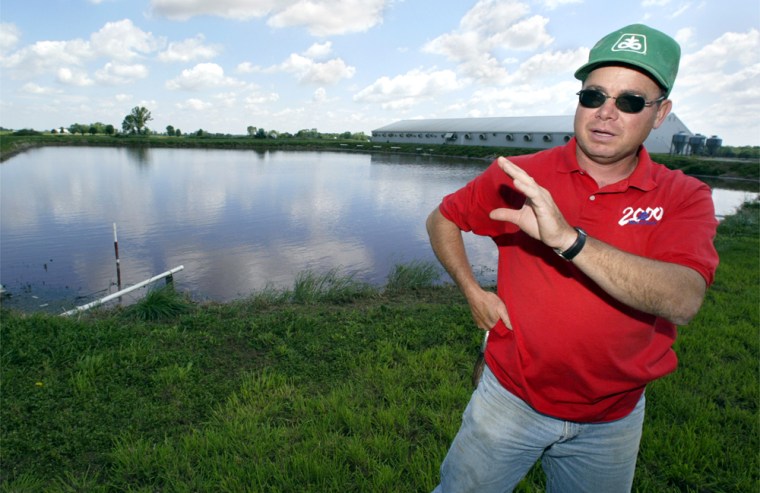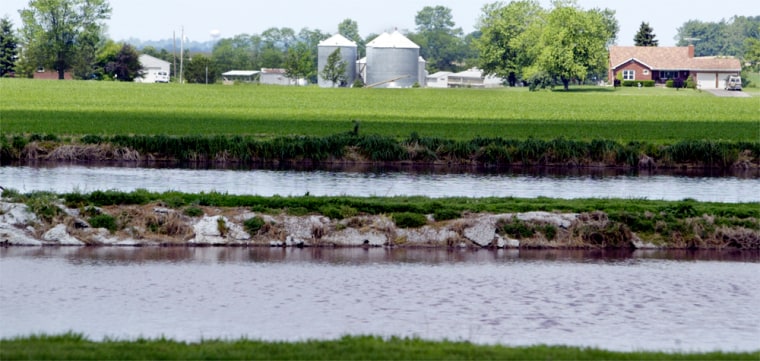Hogs on Mark Legan's farm produce heaps of waste, filling large chambers beneath his barns. But his neighbors are unlikely to know they share the countryside with so much manure.
Legan's property smells only faintly of animal waste. Birds and other wildlife abound in the fields near an open-air manure pit. And each summer, his crops display a carpet of bright green leaves that stretches for acres.
While most hog farms stink, and some contaminate waterways with waste-laden runoff, Legan's operation is one of Indiana's model farms, earning praise for consistently exceeding environmental requirements.
Legan's business, Legan Livestock and Grain, experts say, exemplifies how modern pork producers can balance responsible farming and smart business.
"He has great concern that what he does is not only in compliance but far above the compliance," said Chris Hurt, an agricultural economist at Purdue University.
Legan's operation in Putnam County, about 30 miles west of Indianapolis, produces 15,000 hogs annually, each of which can generate up to four times the waste of an average human.
Bacteria eat manure
The farm is a showcase of conservation. Manure is channeled into clay-lined lagoons filled with bacteria that help digest it. The waste is later sprayed onto crops as fertilizer at carefully determined rates.
Legan inspects the lagoons monthly and uses a sophisticated spraying device equipped with multiple backup systems to prevent spills.
Regulations require farmers to have equipment to halt the flow of manure in an emergency, or they must have an employee to monitor the spraying.

"We do both," said Legan, a former agent with Purdue University's agricultural extension who holds bachelor's and master's degrees from the school. He also serves on the Indiana Water Pollution Control Board.
Manure is not all that gets recycled on Legan's farm. Even dead hogs are put to use, their remains shredded into nutrient-rich compost.
Behind the barns, corn and soybeans are planted in no-till fields to conserve soil. The Legans also have planted a grove of 2,000 trees in a corner of the farm and constructed a pond and an artificial wetland where they host student field trips and conservation meetings.
When they began farming, Legan and his wife, Phyllis, took a weekend getaway to discuss how to meld their business plan with their belief in sustainable agriculture.
The result was a mission statement, printed on each of Legan's business cards, pledging the farm will "emphasize environmental awareness, food safety, community values, family and employee wellness."
Neighbors invited over
Several years later, the Legans invited a crowd of neighbors to tour the barns and munch on pork burgers.
Legan was about to resume production after briefly shutting down the operation to modernize it. But before a single swine passed through the gates, he wanted to demonstrate his good intentions.
"It takes some effort to be a good neighbor," Legan said. "We could follow our operating permit to the letter and still not be a good neighbor."
Legan's cooperative spirit goes beyond serving sandwiches. He will postpone hauling fertilizer if neighbors are having an outdoor gathering or when breezes are likely to carry hog odors to nearby homes.
"If there was a car in our driveway, he did not spread," said Jo Ann Bryan, who lives across the road from Legan's farm. "He always touched base with neighbors at least a couple times a year."
Observers of Indiana's pork industry say Legan is not alone.
"I think a lot of the livestock producers are very aware of not only regulations but also the public image and being able to be a good neighbor," said Alan Sutton, a professor of animal sciences at Purdue. "There's a sense of pride that they want to do the best job possible."
Legan says guarding the environment and building goodwill among neighbors could be key to winning their support if he ever decides to expand his farm.
"This is our community here," he said. "Whatever goes around, comes around."
